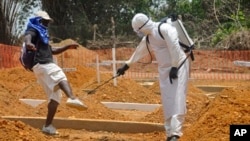The World Health Organization has begun the process of producing new guidelines for responding more quickly and effectively to Ebola and other global epidemics and emerging diseases.
A special review committee is meeting for two days this week at WHO headquarters to produce recommendations to address outbreaks like Ebola.
The panel is looking at how International Health Regulations, known as IHR, were implemented during the crisis in West Africa and how to strengthen them. The IHR is an important legal instrument aimed at protecting populations by preventing and controlling the international spread of disease.
The panel has set up three working groups to identify weaknesses with the Ebola response and seek solutions, according to Didier Houssin, who chairs the committee. He said the first group will focus on the flow of information and communication among member states and the WHO. He said the other groups will cover resources and compliance with policies.
“We have a second group within this committee, which is going to address the question of capacities. Of course, capacities, core capacities in term of epidemiology, surveillance, laboratories, points of entry, etcetera," said Houssin. "And, we have a third group, which will be addressing the question of compliance to rules and the question of the governance of International Health Regulations.”
Houssin said one of the biggest problems is getting countries to comply with the IHR. He said there are many reasons, including the inability of poor states that have poor health systems and lack the financial means to follow through on the epidemiological or surveillance requirements.
He said the committee will look into this problem and consider how to help these states perform better. The panel says it aims to produce its recommendations in time for a meeting of the WHO's decision-making body next May.










